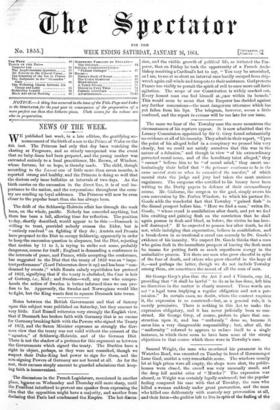The more we hear of the Townley case the more
monstrous the circumstances of his reprieve appear. It is now admitted that the Lunacy Commission appointed by Sir G. Grey found substantially no evidence at all of his insanity. They admit in their report, "Upon the point of his alleged belief in a conspiracy we pressed him very closely, but we could not satisfy ourselves that this was in the nature of a delusion," and though in view " of his extraordinary perverted moral sense, and of the hereditary taint alleged," they " cannot " believe him to be " of sound mind," they assert un- hesitatingly their belief that " the prisoner continues to be in the same mental state as when he committed the murder," of which mental state the judge and jury had taken the most anxious cognizance. The surgeons who certified to his lunacy have been writing to the Derby papers in defence of their extraordinary course. Mr. Gisborne, the surgeon to the gaol, simply avows his own conversion by Dr. Forbes Winslow, to which his partner Dr. Goode adds the wonderful fact that Townley " gained flesh" in the dismal prospect before him. "Here we find a man," writes Dr. Goode, " whose creed is annihilation after death, and yet we find him exulting and gaining flesh on the conviction that he shall again possess in flesh and blood, as before, the victim he has him- self destroyed." If he expected to possess her after death, he did not, while indulging that expectation, believe in annihilation, and a break-down in so irrational a creed can scarcely be Dr. Goode's evidence of his insanity. We suspect Dr. Goode thinks that a man who gains flesh in the immediate prospect of leaving the flesh must be insane for putting forth so much superfluous energy in the assimilative process. Yet there are men who grow cheerful in spite of the fear of death, and others who grow cheerful in the hope of it,—and perhaps the latter, though we do not include Townley among them, are sometimes the sanest of all the sons of men.






























